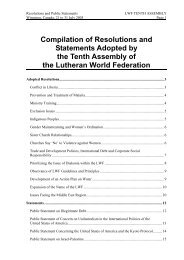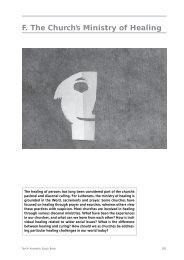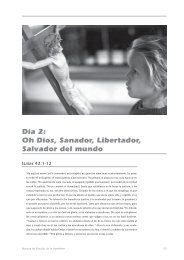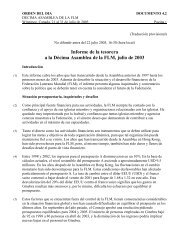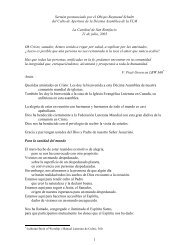first Assembly Update - LWF Tenth Assembly 2003
first Assembly Update - LWF Tenth Assembly 2003
first Assembly Update - LWF Tenth Assembly 2003
- No tags were found...
You also want an ePaper? Increase the reach of your titles
YUMPU automatically turns print PDFs into web optimized ePapers that Google loves.
○ ○ ○ ○ ○ ○ ○ ○ ○ ○ ○ ○ ○ ○ ○ ○ ○ ○ ○ ○ ○ ○ ○ ○ ○ ○ ○ ○ ○ ○ ○ ○ ○ ○ ○ ○<br />
○<br />
Issue 1 — March 2002<br />
The Lutheran World Federation <strong>Tenth</strong> <strong>Assembly</strong><br />
In sixteen-months time, over 430 delegates<br />
from the Lutheran World Federation<br />
(<strong>LWF</strong>) member churches will<br />
gather in Winnipeg, Canada, for the<br />
<strong>LWF</strong> <strong>Tenth</strong> <strong>Assembly</strong>, hosted by the<br />
Evangelical Lutheran Church in<br />
Canada (ELCIC).<br />
Assemblies, considered milestones<br />
for, and manifestations of<br />
the whole Federation, take place<br />
normally every six years. They<br />
hold highest authority over <strong>LWF</strong><br />
A theme is chosen for each <strong>Assembly</strong>.<br />
‘For the Healing of the<br />
World’ is the theme for the 21–31<br />
July <strong>2003</strong> <strong>Assembly</strong>.<br />
As well as delegates, an <strong>Assembly</strong><br />
includes a wide range of<br />
other participants—representatives<br />
of associate member<br />
churches, observers from <strong>LWF</strong><br />
national committees and related<br />
agencies, official visitors, ex-officio<br />
participants, advisors, guests,<br />
opted persons, interpreters and<br />
translators, stewards and accredited<br />
press.<br />
Every <strong>Assembly</strong> elects a President<br />
and a 48-member Council to<br />
lead the Federation through its<br />
annual meetings. The <strong>Assembly</strong><br />
is also responsible for the <strong>LWF</strong><br />
Constitution, gives general direction<br />
to the work of the Federation<br />
and acts on the reports of the<br />
President, General Secretary, and<br />
policy and activity.<br />
<strong>LWF</strong> and local staff including co- Treasurer.<br />
■<br />
○ ○ ○ ○ ○ ○ ○ ○ ○ ○ ○ ○ ○ ○ ○ ○ ○ ○ ○ ○ ○ ○ ○ ○ ○ ○ ○ ○ ○ ○ ○ ○ ○ ○ ○ ○ ○ ○ ○ ○ ○ ○ ○ ○ ○ ○ ○<br />
Logo<br />
The <strong>Assembly</strong> logo<br />
is a teacher and<br />
invites curiosity<br />
works as an<br />
and comment. It<br />
shows a broken<br />
independent artist.<br />
Both ELCIC members,<br />
landscape—white<br />
their artwork for<br />
cracks in earth or<br />
mountains—set<br />
national church events<br />
is well known.<br />
against a cross on<br />
the left and an olive<br />
branch with three large<br />
For information on use<br />
of the logo, please contact:<br />
leaves on the right. The <strong>Assembly</strong><br />
theme, ‘For the Healing<br />
of the World,’ cradles it. The<br />
cross implies movement. One of<br />
the leaves is leaning over the<br />
earth while the others are reaching<br />
toward the sky as a sign of<br />
The logo was designed by two<br />
artists from the Canadian prairie<br />
city of Regina, Saskatchewan. Erik<br />
Norbraten is an art director and<br />
The Lutheran World Federation<br />
Office for Communication Services<br />
P.O. Box 2100<br />
CH-1211 Geneva 2<br />
Switzerland<br />
E-mail: info@lutheranworld.org,<br />
creation and healing.<br />
graphic artist. Richard Nostbakken Fax: +41/22-791 66 30<br />
■<br />
Why Does the<br />
Lutheran<br />
Communion of<br />
Churches Gather<br />
in <strong>Assembly</strong><br />
Message from<br />
Rev. Dr. Ishmael Noko<br />
Dear Sisters and Brothers,<br />
You may ask, “Why do we need to<br />
bring people from around the world<br />
to meet together in an <strong>Assembly</strong>”<br />
Reasons are prescribed in the <strong>LWF</strong><br />
Constitution, such as electing officers<br />
and Council members and acting<br />
on reports. Business conducted<br />
at the <strong>LWF</strong> <strong>Tenth</strong> <strong>Assembly</strong> will be<br />
important in determining future<br />
leadership and directions for the<br />
Federation’s work. But beyond<br />
these requisite constitutional matters<br />
lie some deeply theological and<br />
missiological reasons.<br />
The church (ecclesia)—as the<br />
people of God, the body of Christ,<br />
and the temple of the Holy Spirit—is<br />
by nature an ‘assembly.’ The <strong>LWF</strong><br />
<strong>Assembly</strong> enables churches to<br />
worship, witness, confer and speak<br />
together on matters common to the<br />
whole church, and to express their<br />
unity as part of the one, universal,<br />
new community in Christ.<br />
Since 1990, we as the <strong>LWF</strong><br />
understand ourselves as being<br />
more than a loosely affiliated<br />
federation of churches. We are a<br />
communion of Lutheran churches<br />
Continued on page 2<br />
<strong>LWF</strong> <strong>Assembly</strong> <strong>Update</strong> / No. 1, March 2002 1
Churches Gather in<br />
<strong>Assembly</strong><br />
are increasingly connected<br />
through networking, but all fall<br />
This Triune God also sends us<br />
out for the sake of God’s mission<br />
(continued from page 1)<br />
short of the importance of<br />
gathering together at the same<br />
in the world. Attending to what<br />
that mission means ‘for the healing<br />
united through Word and<br />
time, in the same place, as living<br />
of the world’ is a central reason<br />
Sacrament. This holds us together<br />
beings. Present with one another,<br />
why the <strong>LWF</strong> member churches<br />
in a more profound sense than any<br />
we realize who our sisters and<br />
will assemble in Winnipeg, Canada.<br />
constitutional requirements.<br />
brothers in Christ actually are, and<br />
As we do so, we are held together<br />
“Communion with God and<br />
our generalizations are challenged.<br />
by the power of God’s Spirit, such<br />
communion with one another<br />
In living and working with one<br />
that we are able to speak honestly<br />
are…made possible by God’s self-<br />
another over several days, we<br />
about the challenges facing us and<br />
communication as it comes to<br />
recognize our significantly<br />
our churches, and to discern,<br />
expression in the human acts of<br />
different situations and<br />
debate and decide how these will<br />
preaching the gospel and<br />
perceptions, as well as what we<br />
be addressed through our ongoing<br />
administering the sacraments.” 1<br />
share in common. Through God’s<br />
work as a communion: How will we<br />
© <strong>LWF</strong>/C. ALT<br />
Whenever and wherever we gather<br />
in local congregations to hear the<br />
Word and celebrate the Sacraments<br />
we are reminded that we do so as<br />
grace, we are able in solidarity to<br />
share our pains and joys, our<br />
burdens and gifts, and in that<br />
process begin to understand what<br />
bear faithful witness in word and<br />
deed ‘for the healing of the world’<br />
How will we address the tensions<br />
and problems we face within our<br />
part of the communion of saints<br />
Luther was describing when he<br />
churches and societies How can<br />
worldwide.<br />
explained what occurs through the<br />
this Lutheran communion of<br />
This wider communion must<br />
Sacrament of the Altar:<br />
churches, as part of the wider<br />
become for us more than an<br />
abstract, faceless reality. We must<br />
be able to touch, hear, taste and<br />
experience this reality <strong>first</strong>hand. In<br />
self-giving love, God became<br />
incarnate in a human being.<br />
Similarly, the communion we share<br />
with one another must become<br />
incarnate, in very human, face-toface<br />
kinds of communication and<br />
…through the interchange of<br />
Christ’s blessings and our misfortunes,<br />
we become one loaf,<br />
one bread, one body, one<br />
drink, and have all things in<br />
common.... In this way we are<br />
changed into one another and<br />
are made into a community by<br />
love. 2<br />
church, further God’s allencompassing<br />
mission in and for<br />
the sake of the world<br />
I look forward to seeing, and<br />
being with, those of you who will<br />
assemble in Winnipeg. ■<br />
interactions that enrich, test out<br />
Here we receive the promise, a<br />
and deepen what it truly means to<br />
foretaste of God’s communion<br />
be a communion.<br />
Today, through computer and<br />
other information technology, we<br />
with the whole of creation in the<br />
coming reign of God. This coming<br />
together in Christ, through the<br />
Rev. Dr. Ishmael Noko<br />
General Secretary<br />
Previous Assemblies:<br />
power of the Holy Spirit, has<br />
important ongoing consequences<br />
Notes<br />
1947 Lund, Sweden The Lutheran Church in the World Today<br />
1952 Hanover, Germany The Living Word in a Responsible Church<br />
1957 Minneapolis, USA Christ Frees and Unites<br />
1963 Helsinki, Finland Christ Today<br />
1970 Evian, France Sent into the World<br />
1977 Dar es Salaam, Tanzania In Christ—A New Community<br />
1984 Budapest, Hungary In Christ—Hope for the World<br />
1990 Curitiba, Brazil I Have Heard the Cry of My People<br />
1997 Hong Kong, China In Christ—Called to Witness ■<br />
for our life together as churches<br />
throughout the world.<br />
“God’s self-giving which constitutes<br />
communion with God in<br />
faith, seeks expression in the<br />
pattern of mutual self-giving<br />
love...in forms of mutual sharing<br />
in both its spiritual and material<br />
aspects.” 3<br />
1<br />
Christoph Schwöbel. “The Quest for<br />
Communion. Reasons, Reflections and<br />
Recommendations” in The Church as<br />
Communion, ed. Heinrich Holze, <strong>LWF</strong><br />
Documentation 42, <strong>LWF</strong> Publications,<br />
Geneva 1997, p. 277.<br />
2<br />
“The Blessed Sacrament of the Holy<br />
and True Body of Christ,” Luther’s Works<br />
Vol. 35, p. 58.<br />
3<br />
Schwöbel, p. 279.<br />
○ ○ ○ ○ ○ ○ ○ ○ ○ ○ ○ ○ ○ ○ ○ ○ ○ ○ ○ ○ ○ ○ ○ ○ ○ ○ ○ ○ ○ ○ ○ ○ ○ ○ ○ ○ ○ ○ ○ ○ ○ ○ ○ ○ ○ ○ ○<br />
The <strong>LWF</strong> Council decided that additional purposes of the<br />
<strong>Tenth</strong> <strong>Assembly</strong> are to<br />
• explore ways to be God’s instruments for healing, justice<br />
and reconciliation in the midst of brokenness in church<br />
and society<br />
• deepen the understanding and experience of the Lutheran<br />
communion by addressing differences and disparities,<br />
and by sharing gifts<br />
• commit to closer and deeper cooperation within the<br />
ecumenical movement and to life in communion as<br />
given in Christ<br />
• discern the challenges posed to the Lutheran churches<br />
in today’s multicultural and multi-faith contexts, and<br />
• address spiritual, social and environmental challenges<br />
provoked especially by economic globalization.<br />
■<br />
2 <strong>LWF</strong> <strong>Assembly</strong> <strong>Update</strong> / No. 1, March 2002
Theme<br />
The theme was chosen by the <strong>LWF</strong><br />
Executive Committee from suggestions<br />
made by the <strong>LWF</strong> member<br />
churches in 2000. It is inspired,<br />
among other biblical texts, by the<br />
apocalyptic vision in Revelation<br />
22:2 of the river and tree of life:<br />
“…and the leaves of the tree are<br />
for the healing of the nations.”<br />
Compared to most former<br />
<strong>Assembly</strong> themes, this one explicitly<br />
points to the world and various<br />
contexts in which we live. The truth<br />
that faith confesses must come<br />
alive, be understood, confessed and<br />
lived out in ways that genuinely<br />
speak and respond to the world’s<br />
needs. According to Canadian<br />
theologian Douglas John Hall,<br />
confession takes place when we<br />
view the world through Christian<br />
belief and “are thrust into an active<br />
engagement with that which<br />
threatens the life of our world.”<br />
We cannot ignore a world that<br />
is festering with poverty, divisions,<br />
despair, sickness, violence,<br />
injustice—and situations of many<br />
kinds desperately in need of<br />
healing. HIV/AIDS and other<br />
diseases are stripping many<br />
persons and entire communities of<br />
life and hope. Those left even<br />
further behind by the forces of<br />
economic globalization become<br />
more ravaged and devastated,<br />
while others reach dizzying heights<br />
of affluence. Old and new rivalries<br />
break out, confounding the illusion<br />
that old wounds have actually been<br />
healed. Sin and its effects continue<br />
to be manifest in ever-new ways.<br />
When we assemble together as<br />
a communion, it will not be<br />
primarily to lament the state of the<br />
world. We gather because of our<br />
conviction and proclamation that<br />
the God we know in Jesus Christ<br />
through the power of the Holy<br />
Spirit is ‘for the healing of the<br />
world.’ This is the distinct witness<br />
we as Christians bring to this<br />
widely shared concern for healing.<br />
We will be exploring the<br />
implications of this for our lives,<br />
our congregations, our societies,<br />
and especially for us as a<br />
communion of Lutheran churches.<br />
Healing is a pervasive theme in<br />
Scripture, and especially in the<br />
ministry of Jesus. A number of the<br />
Bible studies will be from Luke’s<br />
Gospel. Here Jesus is conceived,<br />
baptized, and sent forth in ministry<br />
through the power of the Holy<br />
Spirit. He is seen as a Spirit-filled<br />
prophet who healed people of<br />
illnesses associated with unclean<br />
spirits. Jesus healed by restoring<br />
wholeness or integrity to people.<br />
Although ‘healing’ in the<br />
Christian tradition is closely<br />
related to salvation, forgiveness,<br />
reconciliation and liberation, it is a<br />
topic that makes some in our<br />
churches uncomfortable. Crosscultural<br />
perspectives on healing<br />
will need to be considered. Health<br />
is understood according to what is<br />
valued within a given cultural<br />
system. It includes more than<br />
physical health. The focus is not<br />
on the disease itself or on curing,<br />
but on how the personal and social<br />
meaning of the experience of<br />
sickness, injury or disability is<br />
transformed. To be healed is more<br />
than a personal experience. It<br />
involves the wider social,<br />
economic and political order of<br />
relationships.<br />
Social power is reordered<br />
through healing, which is why it<br />
often is threatening to the<br />
established order. Jesus reached<br />
out to touch others, or was himself<br />
touched, across taboo boundaries<br />
of impurity. He drove out demons<br />
whose possession made<br />
individuals powerless to act. He is<br />
depicted as being like a folk healer,<br />
one who took people’s needs for<br />
healing at face value. He entered<br />
individual lives and experiences of<br />
suffering, bringing concrete<br />
liberation.<br />
This theme suggests the need to<br />
give greater attention to the role of<br />
the Spirit, in a triune understanding<br />
of who God is and how God relates<br />
to the world. Through God’s Spirit<br />
we participate in the divine pathos,<br />
present in human history and<br />
throughout creation. We enter into<br />
communion with the crucified and<br />
risen Christ, in whom God’s Spirit<br />
has been made visible and tangible.<br />
Through that same Spirit, we enter<br />
into deeper communion with one<br />
another. For Luther, this was<br />
grounded especially in the<br />
Sacrament of Holy Communion,<br />
which we will celebrate daily at the<br />
<strong>Assembly</strong>.<br />
To ‘receive the Holy Spirit’ is to<br />
see what God is doing in and<br />
through the brokenness of our<br />
lives and world to bring healing<br />
and new life to human beings and<br />
the rest of creation. The Spirit<br />
empowers us to act differently in<br />
relation to one another. Polarity<br />
and hostility that can contribute to<br />
violence are overcome in favor of a<br />
community of solidarity,<br />
responsibility and love. Finitude<br />
and vulnerability are accepted<br />
rather than what we seek to<br />
overcome. Love reaches out and<br />
draws others in, creating diverse<br />
networks of relatedness such as<br />
we can expect to experience at the<br />
<strong>Assembly</strong>.<br />
■<br />
As the theme continues to be developed for the <strong>Assembly</strong> Study Book, you are<br />
invited to reflect on, discuss and send responses to the following questions, or<br />
other feedback, to Rev. Dr. Karen Bloomquist, <strong>Assembly</strong> Content Coordinator,<br />
kbl@lutheranworld.org:<br />
• What are the particular yearnings or cries for healing in your context<br />
• How is this reflected in or being responded to in your church<br />
• What are the ‘diseases, illnesses and wounds’ from which the world suffers,<br />
and within it, the Lutheran communion<br />
• Which theological themes should be developed especially at this <strong>Assembly</strong><br />
Please send us your responses by 15 May 2002.<br />
El Salvador: Reconstruction program<br />
after hurricane Mitch.<br />
■<br />
© <strong>LWF</strong>/WS G. MANGE<br />
<strong>LWF</strong> <strong>Assembly</strong> <strong>Update</strong> / No. 1, March 2002 3
Village Groups<br />
at the <strong>Assembly</strong><br />
Healing Divisions<br />
within the One Church<br />
God’s Spirit is actively healing<br />
the church. Although considerable<br />
progress has been made in<br />
ecumenical relations in recent<br />
years, the healing of old divisions<br />
must continue. How do we draw<br />
upon the meaning and power of the<br />
sacraments for Christian unity<br />
New questions have arisen about<br />
the profile, identity and role of<br />
Lutherans in these ecumenical<br />
relations. New challenges also arise<br />
from Christians with whom we have<br />
not been in dialogue. How is the<br />
<strong>LWF</strong> involved and how might it be in<br />
new ecumenical pursuits What are<br />
© <strong>LWF</strong>/H.WALTER<br />
Russian Federation:<br />
Congregation in Kant<br />
Village Groups will be a central<br />
feature of the <strong>Assembly</strong>. They<br />
spiritual yearnings What difference<br />
do factors such as context<br />
the difficult matters that must be<br />
addressed Toward what ends<br />
The Mission of the<br />
Church in Multi-faith<br />
Contexts<br />
The mission of the church points to<br />
are the settings where Bible<br />
and gender make How can con-<br />
and participates in the coming of<br />
study discussions will occur, and<br />
gregations proclaim and live this<br />
God’s reign. How can every Chris-<br />
where important implications of<br />
out more fully<br />
tian and every congregation be em-<br />
the <strong>Assembly</strong> theme will be pursued.<br />
More will be written on<br />
each of the topics in the Assem-<br />
God’s Healing Gift<br />
of Communion<br />
powered to participate faithfully<br />
and effectively in this mission Rec-<br />
bly Study Book. Work in the Vil-<br />
The communion we share as<br />
lage Groups will develop the sub-<br />
Lutherans is a gift of God for the<br />
stance of the <strong>Assembly</strong> Message<br />
sake of the world. The healing<br />
and commitments. <strong>Assembly</strong> par-<br />
power of prayer and the Eucha-<br />
ticipants will be asked to indicate<br />
rist transforms us into a com-<br />
their Village Group choices when<br />
munion of love. Yet within this<br />
they register.<br />
communion of churches, there<br />
God’s Healing Gift<br />
of Justification<br />
still are differences and wounds,<br />
related to significant historical<br />
struggles and political changes<br />
With the signing of the Joint Dec-<br />
(e.g., the end of communism or<br />
laration on the Doctrine of Justification,<br />
renewed ecumenical attention<br />
is being given to the doctrine<br />
of justification. What is the relationship<br />
between justification,<br />
apartheid), generational and<br />
theological differences (e.g., who<br />
can be ordained), ethnic or cultural<br />
identities, and disparity in<br />
size and financial resources.<br />
Brazil: In the ‘favelas’ around Recife<br />
© <strong>LWF</strong>/ M. EGLI<br />
healing and ‘new creation’ In<br />
Where are forgiveness, healing<br />
onciliation among people is a key<br />
which ways is salvation as for-<br />
and reconciliation especially<br />
aspect of this mission, especially in<br />
giveness of sin, liberation from<br />
needed in this communion How<br />
multi-faith contexts. How can this<br />
bondage, and spiritual healing es-<br />
can communication support and<br />
kind of healing occur through such<br />
pecially needed today How does<br />
build up the communion for the<br />
means as dialogue and living and<br />
this speak to people’s deepest<br />
sake of the world<br />
working together How does this<br />
4 <strong>LWF</strong> <strong>Assembly</strong> <strong>Update</strong> / No. 1, March 2002
challenge and transform some past<br />
mission assumptions and practices<br />
How should this be reflected<br />
in the revised mission document<br />
and in other <strong>LWF</strong> work<br />
Removing Barriers<br />
that Exclude<br />
In our churches and societies, barriers<br />
of discrimination continue to<br />
exclude people with physical or<br />
mental disabilities. Those affected<br />
by HIV/AIDS face additional kinds of<br />
discrimination. How does Christ’s<br />
transforming power break down<br />
these barriers, as well as those<br />
based on race, ethnicity, caste, age<br />
or gender What should we be doing<br />
to remove them Where should<br />
human rights efforts focus The<br />
historical wounds of exclusion tend<br />
to be deep and festering. How can<br />
ruptured relationships with those<br />
who have been excluded be healed<br />
The Church’s Ministry<br />
of Healing<br />
The healing of persons has long<br />
been considered part of the<br />
church’s pastoral and diaconal calling.<br />
For Lutherans, the ministry of<br />
healing is grounded in the Word,<br />
Sacraments and prayer. Some<br />
churches have focused on healing<br />
through prayer and exorcism,<br />
whereas others view these practices<br />
with suspicion. What have been the<br />
experiences in our churches, and<br />
what can we learn from each other<br />
What is the difference between healing<br />
and curing How are we as<br />
churches addressing the healing<br />
challenges posed by the HIV/AIDS<br />
pandemic, especially in impoverished<br />
situations How can healing<br />
occur so that those affected by this<br />
and other traumas can live with dignity<br />
in community with others<br />
minister to people in these situations<br />
Changing understandings of<br />
gender and sexuality affect women<br />
and men. How does our faith speak<br />
to these realities Given the significant<br />
cultural and generational differences<br />
in how we understand<br />
family life and live out our sexuality,<br />
how can we talk about and learn to<br />
live with these differences as part<br />
of the one household of God<br />
Overcoming Violence<br />
Violence in families, as well as in political<br />
conflicts, continues to inflict<br />
deep wounds especially on women,<br />
children and youth. Conflict within<br />
and between countries devastates<br />
land and people. How is the God we<br />
know in Jesus Christ healing violence<br />
in our world today How do we respond<br />
theologically to horrendous<br />
acts of violence How can memories<br />
be healed and cycles of violence overcome<br />
How can the member<br />
churches advocate with others, particularly<br />
through the ‘Decade to Overcome<br />
Violence,’ for the sake of justice,<br />
peace and reconciliation<br />
Transforming Economic<br />
Globalization<br />
The powers of economic globalization<br />
reign over our world today as<br />
a theological challenge. Although<br />
some results are positive, injustice<br />
also mounts, communities are fragmented,<br />
and the earth is further exploited.<br />
How can we as a Lutheran<br />
You are invited to respond to the following<br />
questions via E-mail, fax or by post:<br />
• What does the logo suggest to you in the context of your country,<br />
local community and church<br />
• What does it say about the <strong>Assembly</strong> theme in relation to your<br />
context<br />
• Which insights and questions does it evoke<br />
communion of churches challenge<br />
and hold these powers more accountable<br />
to the vulnerable<br />
through decisions and actions that<br />
can be taken What diverse strategies<br />
are needed Through the <strong>LWF</strong><br />
study process, which commitments<br />
and steps will we take together<br />
with other ecumenical and<br />
civil society partners How are individuals,<br />
congregations and the<br />
member churches involved<br />
Healing Creation<br />
Human beings have spoiled or destroyed<br />
much of God’s creation.<br />
How can creation be restored and<br />
our relationships with the rest of<br />
nature healed How is this related<br />
to sacramental understandings<br />
What can other traditions teach us<br />
What are the power and the responsibility<br />
of human creativity in relation<br />
to the rest of nature, including<br />
through the use of technology<br />
How far should efforts go to heal or<br />
improve human life At what risk<br />
What is at stake theologically ■<br />
Justice and Healing<br />
in Families<br />
God intends human beings to find<br />
meaning and healing through intimate<br />
relationships or ‘families,’<br />
which take many forms throughout<br />
the world. Families are also places<br />
of brokenness, alienation and pain,<br />
where justice, healing and support<br />
are desperately needed. How do we<br />
Mauritania:<br />
Dune-fixation and<br />
reafforestation<br />
© <strong>LWF</strong>/ J. ESKTRÖMER<br />
<strong>LWF</strong> <strong>Assembly</strong> <strong>Update</strong> / No. 1, March 2002 5
Pre-<strong>Assembly</strong> Consultations<br />
An <strong>LWF</strong> tradition, Pre-<strong>Assembly</strong><br />
Consultations assist member<br />
churches in preparing delegates<br />
for full and active participation in<br />
the <strong>Assembly</strong>. They provide an<br />
opportunity for church leaders—<br />
men, women and youth—in the<br />
<strong>LWF</strong> geographical regions to assemble<br />
and discuss current situations<br />
in light of the <strong>Assembly</strong><br />
theme and issues.<br />
There will be five regional<br />
Pre-<strong>Assembly</strong> Consultations: Africa,<br />
Asia, Europe, Latin America<br />
and the Caribbean, and North<br />
America; a Women’s consultation,<br />
and a global Youth consultation.<br />
Meetings for women, and<br />
for youth, will also take place<br />
during the consultations.<br />
Participants will receive detailed<br />
information on the Rules<br />
of Procedure, issues, logistics,<br />
practical matters, worship and<br />
communication. They will discuss<br />
narrative texts assigned to each<br />
region in view of preparing the<br />
tions according to established<br />
numbers for each region, and a determined<br />
rotation procedure.<br />
Each region will discuss crucial<br />
issues related to its situation, future<br />
region’s Bible study presentation<br />
at the <strong>Assembly</strong>.<br />
The consultations will draw up<br />
a slate of Council member nomina-<br />
witness and work. ■<br />
Women 14–17 November 2002 Montreux, Switzerland<br />
North America 23–26 January <strong>2003</strong> Denver, USA<br />
Europe 23–26 February <strong>2003</strong> Vienna, Austria<br />
Asia 02–06 March <strong>2003</strong> Medan, Indonesia<br />
Africa 23–26 March <strong>2003</strong> Nairobi, Kenya<br />
Latin America 06–09 April <strong>2003</strong> San Salvador, El Salvador<br />
& Caribbean<br />
Youth 12–18 July <strong>2003</strong> to be announced later<br />
Youth<br />
© <strong>LWF</strong>/E. KULMALA<br />
Stewards at the<br />
<strong>LWF</strong> Council Meeting<br />
in Turku, Finland,<br />
14–21 June 2000<br />
The profile of youth has changed<br />
dramatically in the life of the <strong>LWF</strong><br />
since 1947. At the <strong>first</strong> <strong>Assembly</strong><br />
in Lund, Sweden, a ‘Commission<br />
of Youth Activities’ was created<br />
because young people were an object<br />
of concern. In 2002, youth are<br />
active participants within the work<br />
and leadership of the Federation.<br />
They comprise 20 percent of delegates<br />
to each <strong>Assembly</strong> and 20 percent<br />
of members in the <strong>LWF</strong> Council,<br />
the highest decision-making body of<br />
the Federation between Assemblies.<br />
One young Council member, Dr.<br />
Mary Janssen van Raay, is vice-chairperson<br />
of the <strong>Tenth</strong> <strong>Assembly</strong> Planning<br />
Committee.<br />
This history of growing youth<br />
participation reflects important<br />
events and decisions along the<br />
way. The 1970 youth pre-<strong>Assembly</strong><br />
gathering, ‘World Encounter of<br />
Lutheran Youth—WELY,’ was<br />
attended by forty-nine young<br />
people. Seven served on the<br />
Steering Committee of the <strong>LWF</strong><br />
Fifth <strong>Assembly</strong>, which met soon<br />
after in Evian, France.<br />
The 1984 <strong>LWF</strong> Seventh <strong>Assembly</strong><br />
in Budapest, Hungary, decided that<br />
delegate participation in future<br />
Assemblies would have regional and<br />
gender balance and would include at<br />
least 20 percent youth. The 1990<br />
<strong>LWF</strong> Eighth <strong>Assembly</strong> in Curitiba,<br />
Brazil, elected seven youth, 20<br />
percent, as full Council members.<br />
As <strong>Assembly</strong> Delegates<br />
The commitment that 20 percent of<br />
<strong>Assembly</strong> delegates from each <strong>LWF</strong><br />
geographical region be youth remains<br />
essential. For each <strong>Assembly</strong>,<br />
on a rotating basis, all<br />
churches are urged to adhere and<br />
nominate youth delegates to ensure<br />
the commitment is upheld. ■<br />
6 <strong>LWF</strong> <strong>Assembly</strong> <strong>Update</strong> / No. 1, March 2002
Women’s Participation in the <strong>LWF</strong><br />
Decisions made at the Seventh <strong>Assembly</strong><br />
in 1984 still challenge us today.<br />
A milestone resolution affirmed<br />
the theological basis for the full participation<br />
of women in the life of the<br />
church and society. With 32 percent<br />
of delegates being women, their<br />
presence in Budapest was much<br />
greater than at the founding <strong>Assembly</strong>,<br />
where there were only five<br />
women among 178 delegates.<br />
The Seventh <strong>Assembly</strong><br />
resolved that 40 percent of<br />
delegates to the Eighth <strong>Assembly</strong><br />
should be women, with a goal of 50<br />
percent for the Ninth and<br />
subsequent Assemblies. With<br />
women’s participation at 43<br />
percent in the Eighth <strong>Assembly</strong> and<br />
49 percent in the Ninth <strong>Assembly</strong>,<br />
women continue to analyze<br />
whether their increased presence<br />
makes a difference.<br />
When the Council, meeting in<br />
2001, approved the study<br />
document, ‘Churches say “NO” to<br />
Violence Against Women,’ people<br />
in other world communions asked<br />
how the Federation was able to<br />
achieve such a commitment on a<br />
global basis. The answer is simple.<br />
Women make up 50 percent of the<br />
<strong>LWF</strong>’s decision-making bodies—the<br />
<strong>Assembly</strong> and Council—and with<br />
them comes the necessary<br />
expertise and experience to act<br />
decisively reflecting an<br />
accountability far beyond mere<br />
participation.<br />
To attain this, much courage<br />
and perseverance was needed.<br />
Preparing for the <strong>Tenth</strong> <strong>Assembly</strong><br />
provides yet another opportunity<br />
to live out the commitment to<br />
women’s full participation.<br />
Accordingly, each church has been<br />
requested to ensure that its list of<br />
delegates includes a designated<br />
number of women to ensure that<br />
50 percent of delegates from each<br />
<strong>LWF</strong> region are women. ■<br />
<strong>LWF</strong> Council Meeting, Turku, Finland,<br />
14–21 June 2000: Ms Julia Ilonga,<br />
Namibia, and Dr Sarada Devi<br />
Karnatakam, India<br />
© <strong>LWF</strong>/D.-M. GRÖTZSCH<br />
Who Are the<br />
Delegates<br />
○ ○ ○ ○ ○ ○ ○ ○ ○ ○ ○ ○ ○ ○ ○ ○ ○ ○ ○ ○ ○ ○ ○ ○ ○ ○ ○ ○ ○ ○ ○ ○ ○ ○ ○ ○ ○ ○ ○ ○ ○ ○ ○ ○ ○ ○ ○<br />
North America: 24<br />
Nordic<br />
Countries: 71<br />
Central Eastern<br />
Europe: 34<br />
The key for allocating delegates to<br />
the <strong>Tenth</strong> <strong>Assembly</strong> provides for at<br />
least two delegates from each<br />
member church. There will be 436<br />
delegates from the 133 member<br />
churches with the provision that<br />
50 percent will be women and 20<br />
percent will be youth (under the<br />
age of 30 years).<br />
■<br />
Latin America and<br />
Caribbean: 31<br />
Central<br />
Western<br />
Europe: 85<br />
Africa: 83<br />
Asia: 108<br />
○ ○ ○ ○ ○ ○ ○ ○ ○ ○ ○ ○ ○ ○ ○ ○ ○ ○ ○ ○ ○ ○ ○ ○ ○ ○<br />
Preparations<br />
○ ○ ○ ○ ○ ○ ○ ○ ○ ○ ○ ○ ○<br />
In preparing an <strong>Assembly</strong>, the<br />
Federation’s General Secretary ensures<br />
that <strong>LWF</strong> constitutional mandates<br />
and Council decisions relating<br />
to an <strong>Assembly</strong> are implemented.<br />
The Council has appointed<br />
an <strong>Assembly</strong> Planning Committee<br />
with representatives from the member<br />
churches to make recommendations<br />
and review plans. Rev. Susan<br />
Nagle of the Evangelical Lutheran<br />
Church in America serves as committee<br />
chairperson.<br />
<strong>Assembly</strong> Coordinators have<br />
responsibility for preparations in<br />
particular areas such as content,<br />
worship, communication, logistics,<br />
finance, pre-<strong>Assembly</strong> consultations<br />
and the pre- and post-<br />
<strong>Assembly</strong> visitation program. The<br />
Deputy General Secretary is<br />
responsible for coordinating<br />
Council-related matters.<br />
An <strong>Assembly</strong> Office has been<br />
established to work within the<br />
<strong>LWF</strong> Secretariat in Geneva,<br />
Switzerland, to ensure overall<br />
coordination. In the <strong>Assembly</strong><br />
Office, Rev. Arthur Leichnitz<br />
serves as <strong>Assembly</strong> Coordinator<br />
with Ms Margit Eggert as<br />
Administrative Assistant.<br />
An <strong>Assembly</strong> Local Committee,<br />
appointed and supported by the<br />
Evangelical Lutheran Church in<br />
Canada, the host church, is<br />
facilitating the preparations. The<br />
committee chairperson is Ms<br />
Rhonda Lorch, ELCIC Office<br />
Manager.<br />
<strong>Assembly</strong> Office<br />
Tel.: +41/22-791 63 71 and 63 72<br />
Fax: +41/22-791 66 30<br />
assembly@lutheranworld.org ■<br />
<strong>LWF</strong> <strong>Assembly</strong> <strong>Update</strong> / No. 1, March 2002 7
<strong>LWF</strong> <strong>Assembly</strong> <strong>Update</strong> No. 1<br />
March 2002<br />
Published by:<br />
The Lutheran World Federation<br />
Office for Communication Services<br />
PO Box 2100<br />
1211 Geneva 2, Switzerland<br />
Tel. +41/22-791 61 11<br />
Fax +41/22-791 66 30<br />
assembly@lutheranworld.org<br />
www.lwf-assembly.org<br />
Revised edition<br />
Host Church<br />
The Evangelical Lutheran Church in Canada<br />
Although the ELCIC was formed<br />
in 1986, the history of Lutherans<br />
in present-day Canada goes back<br />
almost 400 years. The <strong>first</strong><br />
Lutheran worship service in<br />
North America took place in 1619<br />
near Churchill in northern<br />
Manitoba. It was led by a Danish<br />
pastor, Rasmus Jensen, who accompanied<br />
an ill-fated expedition<br />
searching for a northwest passage<br />
from Europe to the Far<br />
East. Early German Lutheran<br />
settlement in the eastern province<br />
of Nova Scotia began over<br />
250 years ago.<br />
To find pastors and serve<br />
communities, relationships<br />
developed among various<br />
Lutheran synods and councils in<br />
North America. Many of the<br />
institutional links for Canadian<br />
Children from local Anglican<br />
and Lutheran congregations<br />
Lutherans were north-south into<br />
the United States of America<br />
rather than across Canada. In<br />
1967 and 1968, the Canadian<br />
© CANADIA LUTHERAN<br />
congregations of the American<br />
Lutheran Church formed the<br />
Evangelical Lutheran Church of<br />
Canada (ELCC). In 1986, the ELCC<br />
joined with the Canada Section of<br />
the Lutheran Church in America<br />
to form the ELCIC.<br />
There are approximately<br />
189,000 baptized ELCIC members<br />
gathered in 627 congregations. Rev.<br />
Raymond Schultz serves as<br />
National Bishop. There are five<br />
ELCIC synods ranging in<br />
membership from 15,000 to 73,000<br />
members. A bishop serves each of<br />
these. The ELCIC national offices<br />
are located in Winnipeg.<br />
ELCIC Web site: www.elcic.ca<br />
ELCIC Worship Web site:<br />
www.worship.ca<br />
■<br />
Winnipeg—An Historic<br />
Meeting Place<br />
○ ○ ○ ○ ○ ○ ○ ○ ○ ○ ○ ○ ○ ○ ○ ○ ○ ○ ○ ○ ○ ○ ○ ○ ○ ○ ○ ○ ○ ○ ○ ○ ○ ○ ○ ○ ○ ○ ○ ○ ○ ○ ○ ○ ○ ○ ○<br />
© TOURISM WINNIPEG/D. REEDE<br />
Above: The Forks, Winnipeg<br />
Right: Liturgical dance<br />
© CANADA LUTHERAN<br />
‘The Forks’ in downtown Winnipeg<br />
has been an important meeting<br />
place for more than 6,000 years.<br />
The city’s name, which in the Cree<br />
language means ‘muddy waters,’<br />
flows from that history. The Forks<br />
is where the waters of the Red<br />
River and Assiniboine River come<br />
together—churning up muddy water—as<br />
part of a vast continental<br />
network of waterways that has encouraged<br />
transportation, trade and<br />
settlement.<br />
For centuries,<br />
aboriginal peoples<br />
came here to trade.<br />
European fur traders,<br />
Métis buffalo hunters<br />
(descendants of<br />
European and<br />
Aboriginal people),<br />
Scottish settlers,<br />
riverboat workers,<br />
railway pioneers and tens of<br />
thousands of immigrants who flowed<br />
through the Forks onto the prairies,<br />
joined them. Today, The Forks is a<br />
dynamic setting in downtown<br />
Winnipeg where people gather for<br />
celebrations, recreation and to meet<br />
one another. This is where a Sunday<br />
ecumenical celebration will take place<br />
during the <strong>Assembly</strong>.<br />
Winnipeg, with a population of<br />
about 685,000, is the capital city of<br />
the province of Manitoba. The<br />
Canadian population stands at 31<br />
million. You will hear more about<br />
our host city in future <strong>Assembly</strong><br />
<strong>Update</strong>s.<br />
Web site:<br />
www.tourism.winnipeg.mb.ca<br />
Click on the smiling face to receive<br />
a warm welcome and introduction<br />
to the city.<br />
■<br />
8 <strong>LWF</strong> <strong>Assembly</strong> <strong>Update</strong> / No. 1, March 2002



